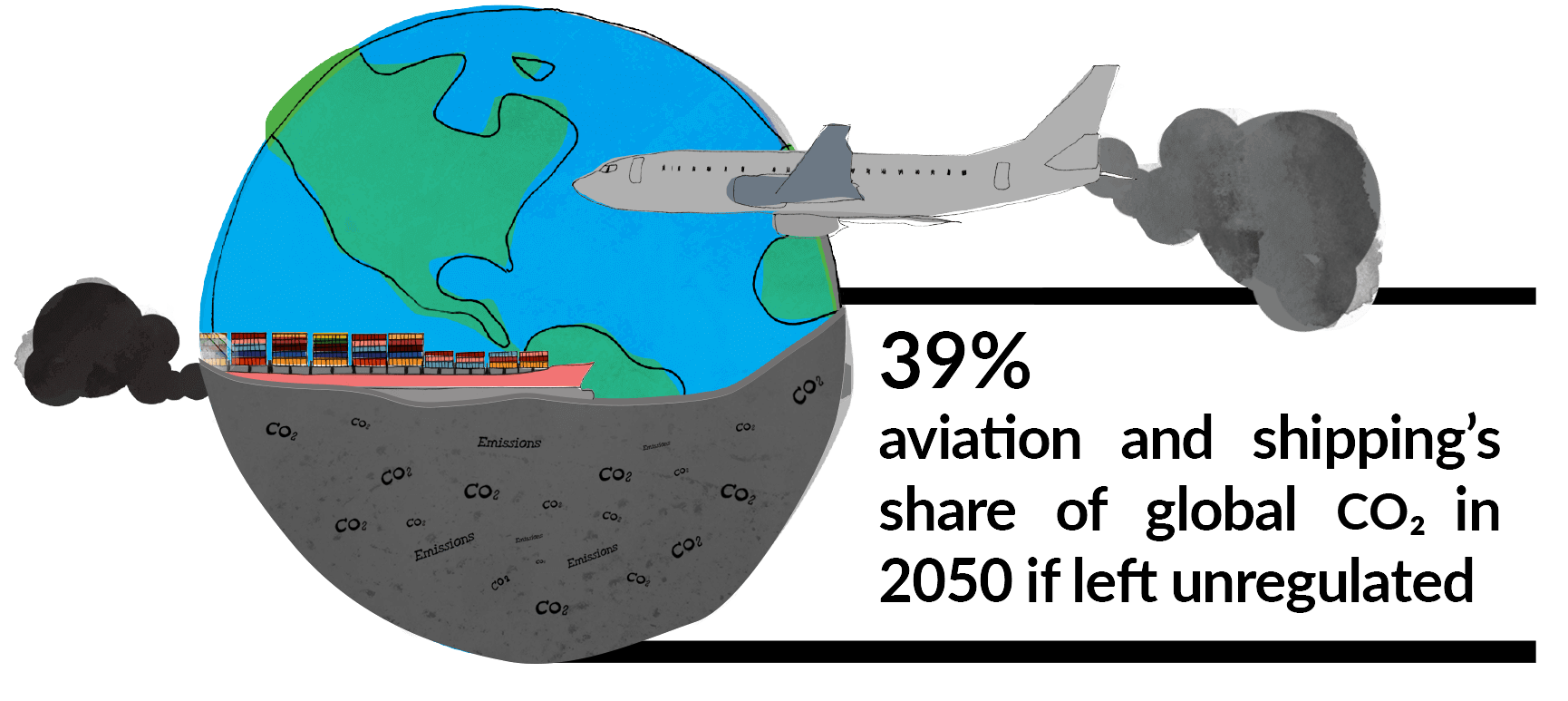Spotting the elephants in the room
In a year when all roads led to Paris, and all countries and all sectors of the economy were expected to offer up their share of emissions cuts, the aviation and shipping industries stood aloof from the negotiations, hoping to go unnoticed. Commercial aviation accounts for 5% of global warming while CO2 from shipping is about 3% of the global total. In recent years their emissions have grown twice as fast as the those of the global economy. Escaping national emissions targets because of their international nature, they were the elephants in the climate talks room.
So T&E set out to expose them as just that. Starting with two ‘elephants’ protesting outside a sleepy meeting of the International Maritime Organisation (IMO) in London in November, we relayed the findings of the European Parliament’s scientific study: that planes and ships could make up 39% of world CO2 emissions in 2050 if left unregulated. In the end, the two sectors escaped explicit mention in the Paris agreement but had been left with an implicit onus by world leaders to get their houses in order to limit global warming to 1.5°C.

Crucial to placing that onus on shipping was a new EU law to monitor, report and verify the CO2 emissions and fuel efficiency of vessels in Europe. This makes ship fuel efficiency rankings possible and democratises access to data in the shipping industry. Modest though it is, it is still the first EU climate law covering shipping. T&E, which had championed it, found common cause with shipping users and worked together with the Clean Shipping Index – a non-profit platform bringing together shipowners and cargo owners – to make the business case for greater efficiency in the IMO.
It was the beginning of a shake-up for an industry in denial about the failure of the market to economise fuel burned. T&E’s expert study found new ships built were on average 10% less fuel-efficient than those built in 1990 while 61% of container ships built in 2014 were beating the new ‘Energy Efficiency Design Index’ standard that the IMO had set for new ships in 2020.
 “‘Where is the pledge for international shipping, and where is the pledge for international aviation?’ They haven’t got one. They’re the two elephants in the room, but they’re not in the room.”
“‘Where is the pledge for international shipping, and where is the pledge for international aviation?’ They haven’t got one. They’re the two elephants in the room, but they’re not in the room.”
- Bill Hemmings, aviation and shipping director
New York Times, 3 June 2015
Airlines were faring little better on fuel burn as the International Civil Aviation Organisation (ICAO) debated a fuel efficiency standard for new aircraft. T&E increased the pressure on the industry to act, highlighting data showing fuel efficiency improving at a rate of just 1.1% per year – meaning ICAO’s 2020 goal would be met 12 years late. On lucrative transatlantic routes some of the world’s largest airlines, including British Airways, Lufthansa and United Airlines, were among the least efficient. BA, the worst performer, burned 51% more fuel per passenger-kilometre than the most efficient carrier. In the US, the Environment Protection Agency offered a chink of light, announcing that aircraft emissions endanger human health and would therefore need to be regulated. It placed the ball firmly in ICAO’s court. Back in Europe, T&E ensured that Europe at least regulated the emissions it was legally obliged to, exposing which international airlines had been fined for non-compliance with the EU’s emissions trading system. Painstaking research also revealed €60 billion in public support for the industry globally, via tax breaks on its fuel.
With the stage set for the Paris summit, T&E was a constant presence at the UNFCCC’s drafting meetings in Bonn and ensured aviation and shipping emissions were included in the deal presented to world leaders. We also saw the need to make the moral argument, supporting the Marshall Islands – a nation in mortal danger from rising sea levels while being the world’s third biggest ship registry – as it pleaded its case with the IMO and later the UN climate conference. It was instrumental in bringing together the ‘high-ambition’ coalition of nations that would eventually ensure the Paris conference aimed for worthwhile limits on rising temperatures. In the final days, ICAO and IMO pushed hard to have their emissions excluded from the deal, rightly earning them the ‘Fossil of the Day’ award from NGOs. But months of irrefutable scientific evidence and moral argument had taken their toll, and European shipowners – fearful that Europe instead of the IMO would act first – pleaded for shipping to be reinstated in the Paris deal. The die had been cast, and UN chief Ban Ki-moon and climate conference president Laurent Fabius demanded ICAO and IMO finally act in 2016.
Learn more
http://www.transportenvironment.org/what-we-do/aviation
http://www.transportenvironment.org/what-we-do/shipping





